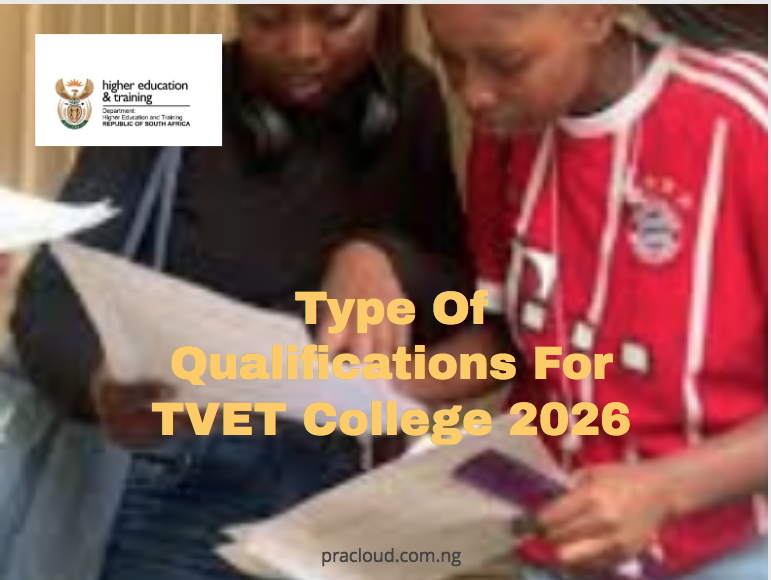Type Of Qualifications For TVET College 2026
Type Of Qualifications For TVET College 2026
Type Of Qualifications For TVET College 2026
In 2026, Technical and Vocational Education and Training (TVET) colleges continue to play an important role in equipping young people and adults with practical skills that meet the demands of South Africa’s growing economy. These institutions are mapped to bridge the gap between theoretical knowledge and real-world application, making them a valuable alternative to traditional universities. One of the key aspects that attracts students to TVET colleges is the broad range of qualifications they provide, each reshaped to meet different interests, industries, and career goals.
TVET colleges provide three main types of qualifications: the National Certificate (Vocational), commonly known as NC(V); NATED or Report 191 Programmes; and various occupational qualifications and skills programmes. The NC(V) is designed for students who have completed Grade 9 and want to pursue a vocational path while still continuing with subjects like Mathematics and Languages. It runs over three years (Levels 2–4) and focuses on specific career fields such as Engineering, Hospitality, IT, and Business.
NATED programmes, on the other hand, are more traditional in structure and consist of N1 to N6 courses. These are usually taken by students after completing Grade 12 and lead to a National Diploma after completing both theoretical and practical components. Lastly, occupational qualifications and learnerships focus more on hands-on training and are often linked directly to industry needs, making them ideal for those looking to enter the workforce quickly.
There are three main types of qualifications offered at TVET colleges:
The National Certificate: Vocational (NCV)
The National Certificate: Vocational (NCV) is a skills-focused qualification aimed at addressing the skills demand in the country.
Do not confuse an NCV with an NSC (National Senior Certificate).
There are clear differences between a National Senior Certificate (NSC) and a National Certificate: Vocational (NCV). AN NSC gives learners more of a general education (Grades 1 – 12), with a stronger focus on academics.
An NCV is directed at vocational training. Students study skills in a specific field of work.
An NCV is typically a three-year course that is designed to provide both theory and practical skills to a student, and also provides students with the opportunity to experience workplace situations while studying.
National Certificate: Vocational requires students to have at least completed grade 9.
Some universities accept NCV qualifications, but it depends on the course and its requirements, as well as the admission requirements of the university.
The Report 191 Programmes
Also referred to as National Accredited Technical Education Diploma (NATED) programmes, these require students to have a matric certificate.
The programmes consist of 18 months of theoretical studies at colleges and 18 months of relevant practical application in workplaces.
The theoretical part of the programme must be followed by a minimum of 18 months’ practical application of knowledge in a workplace for a student to be awarded the National N Diploma, Level 6.
This qualification develops a student’s technical and theoretical knowledge, and the workplace knowledge and skills required in their chosen occupational/vocational area.
The National Introductory Certificate (N4)
The National Introductory Certificate (N4) is a bridging course which prepares students for entry into the N4 – N6 programmes.
It is an ideal option for students who do not meet the academic requirements in order to gain direct entry into the National N4 – N6 qualification, but who wish to pursue their studies further.
The period of study towards this qualification is typically a period of one year.
The qualification’s design enables learners to progressively obtain the qualification by completing the related N4, N5 ,and N6 courses in a particular vocational/occupational area, either separately with breaks between, or in one extended study period of a year or 18 months.
National Certificates (N4)
A National N4 Certificate is the first course in any NATED Programme.
An N4 from a TVET college means that you have achieved the basic skills in a specific industry for a NATED Programme.
After students have completed and passed the N4 National Certificate, they can apply for the N5 National Certificate.
Many students who have completed their N4 National Certificate can gain entry into the next course (which is the N5 National Certificate) and then the N6 National Certificate, which is then followed by the N6 National Diploma.
This is all about the Type Of Qualifications For TVET College. For more information on TVET College, click here. We do hope this article on the Type of Qualifications for TVET College was helpful. You can ask your question in the comment section.
RELATED LINKS






